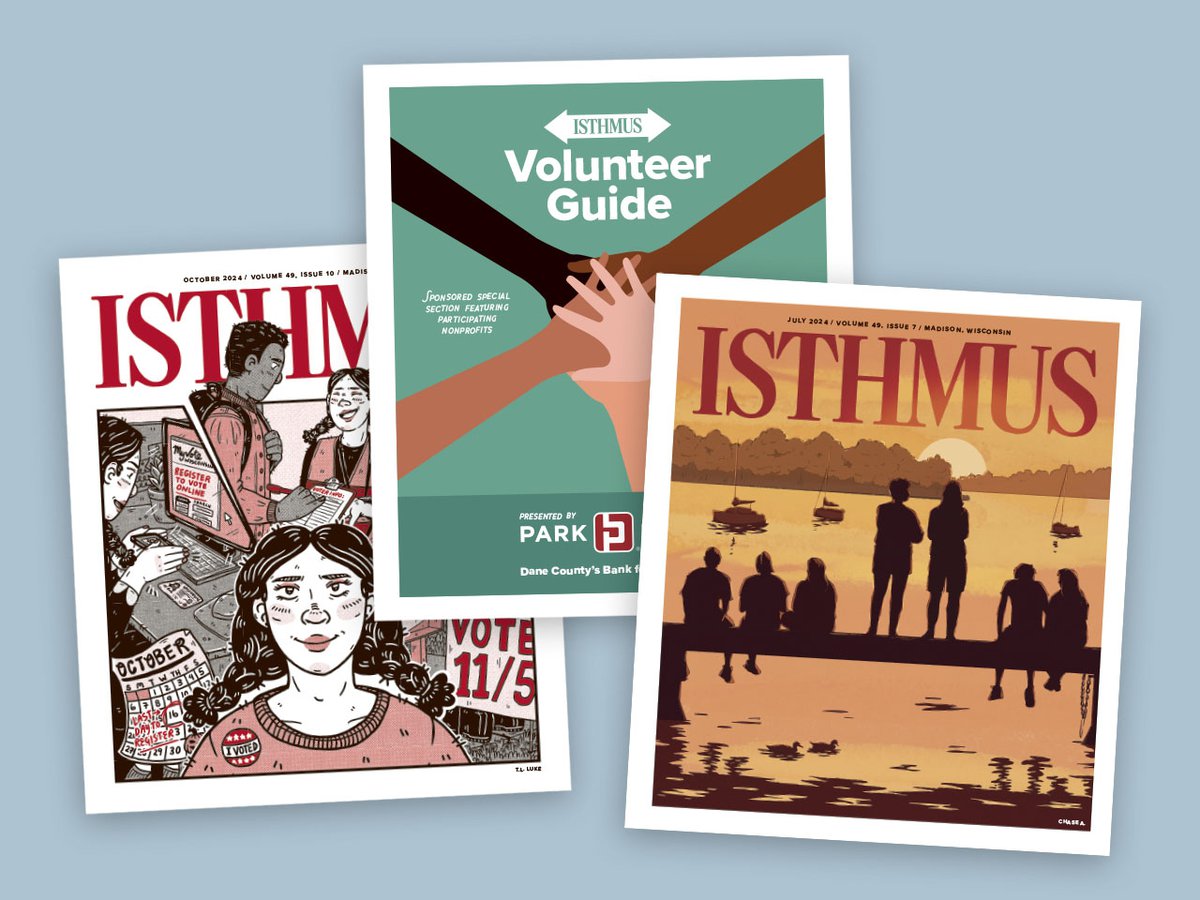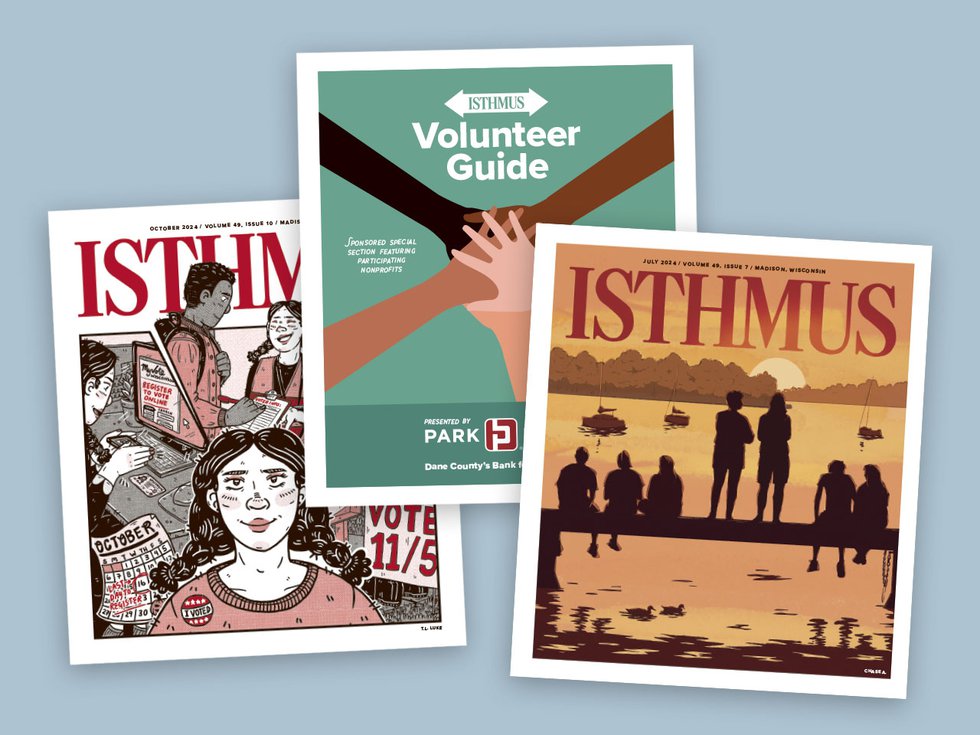Count me among the journalists CNN media analyst Brian Stelter referred to in a piece he wrote a week after the Nov. 5 election.
“Some journalists are feeling defeated in the wake of Trump’s victory — not necessarily because they preferred Harris, but because they are acutely aware that many voters tuned out the fact-driven news coverage of Trump and Harris altogether. In the words of one radio journalist, who insisted on anonymity to speak frankly, it is ‘hard not to see this election as just a national repudiation of what we do.’”
While it was purely coincidental that we scheduled our first Nonprofit Issue to run right after the election, it turned out to be good timing. Why? It offered a different perspective on the turmoil in the world, shining a bright light on the good work happening in our own community.
Judging from the feedback, the coverage was welcomed and uplifting. And our team was reminded of the important role that local journalism plays.
We are committed to doing more of the same in 2025 and are in the middle of our year-end fundraising drive to make sure we have the resources to take on special projects like the Nonprofit Issue. We are once again running a campaign through NewsMatch, a program of the Institute for Nonprofit News, with additional matches from a group of community members and our board of directors. Being able to triple donations is a good deal.
People who give to organizations often like to know how their money is being spent. So some fundraising pitches include details. Hunger-prevention groups, for instance, often share how much money it takes to feed a certain number of families.
But quantifying the impact of journalism is a bit harder. Sure, you can draw a pretty straight line if an investigation forces a corrupt politician from office (that used to happen) or leads to a change in law. But that’s rare. And it’s become harder to measure online engagement due to unreliable web analytics, or to do traditional media audits of print readership because they are too costly.
So we take an expansive view on our impact; here are some reasons to support Isthmus.
1. We write stories you won’t read anywhere else: Exclusive enterprise reporting this year included: A profile of Jason Ilstrup, president of Downtown Madison Inc. and a leader to watch, by Doug Moe; an exploration of how Monona could help solve Madison’s housing crisis, by Bill Graf; and an in-depth piece on Wisconsin’s standing as a birding hot-spot, by Mike Ivey. We also run monthly personal essays, such as Rebecca Jamieson’s “Letter from a childless cat lady.”
2. We remain committed to quality: We have all noticed the increasing errors in newspaper copy and the “chyron” or captions that are superimposed on TV screens (i.e. “Teacher evaulation bill passes”). That’s because no one has dedicated copy editors anymore and inexperienced and/or overburdened staffers are often running the show. At Isthmus we continue to devote considerable time and effort to expert writing, editing, copyediting and proofing. Even with our tiny staff, we don’t cut corners; I think it shows.
3. We answer questions like, “Why are the school district and city asking for more money?” We covered the big city news, including the budget gaps plaguing both the city and Madison school district, Madison’s housing crisis and the launch of bus rapid transit. We shined a light on the millions of dollars in lost revenue to the city due to the nonpayment of municipal fees by the state.
4. We prioritize civic engagement at a time of low trust in government: With an historic election coming up, in a battleground state, we partnered with graphic artist T.L. Luke and tried something new. For six months, T.L. penned comics for the print edition that provided context for voters, whether it was to explain the school referendum questions or changes in absentee voting. T.L packed a lot of information into a visually compelling package. Cheers to the visual learners out there!
5. We connect you to your community: Thanks to Bob Koch, Isthmus has the best darn arts and entertainment calendar in the city; we know it’s well used and treasured. One recent Friday we had some 140 events listed for the metro area. No one else beats that.
6. We save resources and expand audiences through collaborations: We partner with Wisconsin Watch, printing one of their in-depth investigative pieces most months. This year that included stories on the explosive costs of Wisconsin’s youth prisons; book banning efforts in Wisconsin school districts; and the state’s long-term care crisis.
We also collaborated with WORTFM on a multimedia project exploring the impacts of Wisconsin’s recent redistricting on civic engagement. Our project was one of 17 — from nearly 80 applications — to be supported by a Democracy Day grant. And we again partnered with the Wisconsin Film Festival, distributing the print schedule in our March issue.
7. We still cover the arts! While arts critics no longer exist at most major papers, we expanded our arts coverage this year due to the efforts of associate editor Linda Falkenstein and some new contributors, including Dan Koehn, an Isthmus board member, who reviews opera, and David Tabachnick, who writes about dance. We cover music, from local bands to classical performances to touring acts, and highlight the work of local authors.
8. We prepare you to vote: We update and publish concise, easy-to-follow voting guides in English and Spanish for all elections.
9. We serve as a springboard for young artists and journalists: Art director Tommy Washbush met Chase A. at a Madison College graphic design program portfolio show and a couple of months later Chase’s wonderful illustration, set on a pier at the Memorial Union, graced the July cover of Isthmus. In September, an illustration by Chase accompanied an essay in Madison Magazine. Chase’s experience is not unique.
We also continue to work with a reporting intern each semester. Our summer intern, Graham Brown, who gravitated toward arts writing, has continued working with us as a freelancer, producing this month’s article on public art (see page 21).
10. We provide sponsorship space for local businesses and nonprofits: Ads are content, especially when they are local, which ours are. Through our partnership with Community Shares of Wisconsin, for instance, we help promote the group’s “Backyard Heroes” campaign honoring hard-working volunteers. This year our sales team launched a new initiative, the Isthmus Volunteer Guide, to help match volunteers with nonprofit organizations. Development director Mark Clear heard about the idea from Willamette Week in Portland, and we made it our own, featuring 26 local organizations. Many thanks to Park Bank and the other sponsors who made the guide possible.
What’s next?
Working with consultant Jeff Burkhart, we held an all-day retreat earlier this year with our board of directors to start work on a strategic plan that is still unfolding. We are very excited to start working with two new board members: Ted DeDee, the former president and CEO of the Overture Center, and Jason Stephens, portfolio manager and CEO of Thompson Investment Management.
We are close to finally offering some benefits to our employees, and will keep trying to get a piece of the pie from Press Forward, a half-billion dollar funding initiative for journalism, and pursue other grant opportunities as well.
We have a new calendar feature that allows organizations to submit their own information online and will be hosting information sessions on that soon. We have a new take on next year’s WinterTimes special issue and are also planning to make the Nonprofit Issue an annual tradition. Challenging times are ahead, but with the support of our readers, donors, board members and contributors, we will fight despair with a continued focus on local, in-depth reporting and good storytelling. It’s what we do.


